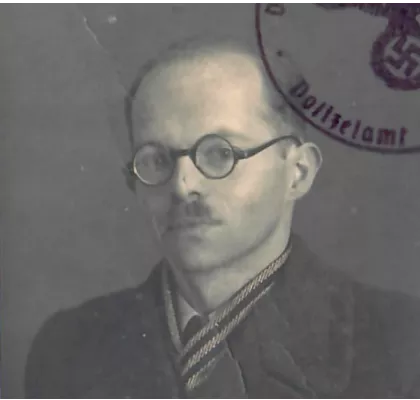Albert Youngman (1925 - 2023)
The Nazi hunter
- © USC Shoah Foundation
Albert Youngman, formerly Albert Jungmann, was born on 17 May 1925 in Vienna, where he lived with his mother Josephine Jungmann, former Fleischmann and later Reismann, his father Heinrich Jungmann and his stepfather Heinrich Reismann until he was 17 years old. Albert was not religious. In his youth, he celebrated his bar mitzvah and Jewish holidays in the synagogue for, as he put it, social but not religious reasons.
Albert Youngman was also a member of the Zionist youth organisation Hashomer Hatzair. In the group, they discussed various topics, danced and experienced culture. The group learnt different types of manual work to prepare for the development of Israel. This knowledge later provided useful in the Nazi camps. Albert was also a member of the "Wiener Mischlingsliga" resistance group. The group was involved in dissident propaganda and supporting partisans in what was then Yugoslavia. They built caves in the Vienna woods to hide and avoid deportation. Youngman himself left hardly any reports about his resistance activities. According to the historian Eleonore Lappin Eppel, however, he was responsible for maintaining the organisation in Theresienstadt and, according to the personnel file of the Vienna State Police, he worked illegally for the KPÖ (Austrian Communist Party) from 1941 until the liberation in 1945. After the war, he received an internal group award from the "Wiener Mischlingsliga" for his achievements.
Shortly before the start of the war, Heinrich Jungmann's attempt to emigrate to Australia with his son failed. In 1940, at the age of 15, Albert was sent to his first forced labour camp in the south of Austria, on the border with what was then Yugoslavia. There, he was forced to do hard physical labour building a power station on the river Drau in Lavamünd. This was followed by various manual labour jobs in Vienna. Albert and his mother were deported to Theresienstadt in June 1943. His mother's work, handing out ration cards to the Jewish population, and the later work of Youngman himself, clearing out the flats of deported Jews, had saved them from deportation for a long time. Albert's father eventually managed to flee to the USA via various detours. His stepfather had already been deported to Poland in 1940 and from there, on to Siberia.
Albert Youngman had been in Theresienstadt for around nine months when he volunteered to work in Wulkow to protect his mother from deportation. In Wulkow, Albert worked as an electrician and specialised in installing telephones in the camp. This job gave him certain privileges as he worked together with SS officers in their barracks. The work also gave him access to a room where parcels from relatives were stored and withheld from the prisoners. When he stole parcels and was caught, he was severely abused by the camp commandant Franz Stuschka and presumably deported to Sachsenhausen as a punishment.
In November 1944, Norwegian political prisoners registered Albert Youngman in the camp. They gave him the red triangle instead of the yellow star. Albert was therefore considered a political prisoner, not a Jewish one. This would have saved his life. In Sachsenhausen, Albert experienced hour-long roll calls, twelve-hour working days and fell ill with pneumonia. At the end of April 1945, the death march from Sachsenhausen to the north-west began, which he also survived. On this march, Albert was reunited with his friend and fellow prisoner from Wulkow., Hans Edel. They were both liberated near Schwerin. Albert's mother survived and was liberated in Theresienstadt.
Albert Youngman returned to Austria and was already working for the Vienna State Police by July 1945. The large number of communists and former prisoners like Youngman in the state police contributed significantly to the initial denazification and the establishment of democratic structures.
Our job was to hunt down Nazis, and I was good at it. Tracking them down, preparing
the prosecution, the investigations, the testimonies. [...] I went undercover a few times and pretended to be a former SS man.Albert Youngman, 1996
Albert Youngman himself was partly responsible for Stuschka's arrest and was directly involved in the investigation against him. After his return, he married Ann Lehotzky and in 1948 they emigrated to the USA with their young daughter Eva. Their son Ken was born there a little later. Albert re-learnt the profession of floor layer and successfully opened his own business.
Albert Youngman later kept in touch with other Wulkow prisoners and attended the big reunion in the USA in 1997. He died January 4, 2023.

